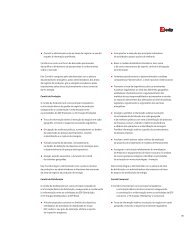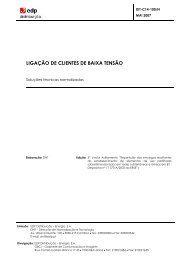business plan for 2004 - EDP
business plan for 2004 - EDP
business plan for 2004 - EDP
You also want an ePaper? Increase the reach of your titles
YUMPU automatically turns print PDFs into web optimized ePapers that Google loves.
MACROECONOMIC FRAMEWORK<br />
>> 1 Global Economy<br />
A number of events occurred in 2003, that affected the<br />
existing favourable economic <strong>for</strong>ecasts, particularly the<br />
war in Iraq, the per<strong>for</strong>mance of the stock markets and the<br />
difficulties experienced by the leading European<br />
economies in regaining greater economic growth. The<br />
Acute Respiratory Syndrome epidemic that affected<br />
several Asian countries in particular also had negative<br />
economic consequences worldwide.<br />
As expected, 2002 was used by the leading global<br />
economies to attempt to counteract the economic<br />
slowdown seen in particular following the September 11<br />
attacks. According to the IMF, the global economy grew<br />
by 3.0% in 2002, underpinned particularly by the<br />
per<strong>for</strong>mance of the North American economy and of<br />
several Asian economies, given the still weak<br />
per<strong>for</strong>mance of the European Union and of the Japanese<br />
economy, and of the instability seen in several countries<br />
of Latin America.<br />
GDP at Constant Prices<br />
2.8%<br />
2.0%<br />
1.7%<br />
1.6%<br />
1.6%<br />
1.4% 1.5%<br />
0.9%<br />
2.3%<br />
1.5%<br />
0.4%<br />
2001 2002 2003<br />
Portugal Spain Euro Area Brazil<br />
The end of some of the factors that upset the global<br />
economy in 2003, particularly the quick end to the Middle<br />
East conflict, brought some confidence <strong>for</strong> to the economy<br />
and, according to the latest IMF <strong>for</strong>ecasts, the global<br />
economic growth in 2003 stood at 3.2%, slightly higher than<br />
the figure achieved in 2002.<br />
As predicted at the end of 2002, the decline of oil<br />
production in Venezuela caused by the general strike that<br />
marked the beginning of the year in that country and the<br />
initial apprehension as to the duration and consequences<br />
of the likely military conflict in Iraq led to an increase of<br />
oil prices during the early months of 2003, though the<br />
prices of this raw material fell later in the first half.<br />
Trading prices were generally between 25 and 30 dollars<br />
during the second half of the year.<br />
To encourage the upturn of economic growth without any<br />
great inflationary pressures the downward trend of<br />
interest rates seen at the end of 2000 was heightened. The<br />
historic lows seen in 2002 fell even further, with the<br />
European Central Bank fixing its refinance rate at 2.0%,<br />
0.75 percentage points less than in 2002, while the North<br />
American Fed Funds rate was fixed at 1.0%, 0.25<br />
percentage points less than the previous year.<br />
Benchmark Interest Rates<br />
25.40% 26.30% 26.30% 26.30% 26.30% 25.80%<br />
24.30%<br />
21.80%<br />
19.80%<br />
19.80%<br />
17.30% 16.30%<br />
2.75% 2.75% 2.50% 2.50% 2.50% 2.00% 2.00% 2.00% 2.00% 2.00% 2.00% 2.00%<br />
1.25% 1.25% 1.25% 1.25% 1.25% 1.00% 1.00% 1.00% 1.00% 1.00% 1.00% 1.00%<br />
Jan-03 Feb-03 Mar-03 Apr-03 May-03 Jun-03 Jul-03 Aug-03 Sep-07 Oct-03 Nov-03 Dec-03<br />
BCE FED Brazil (Selic)

















